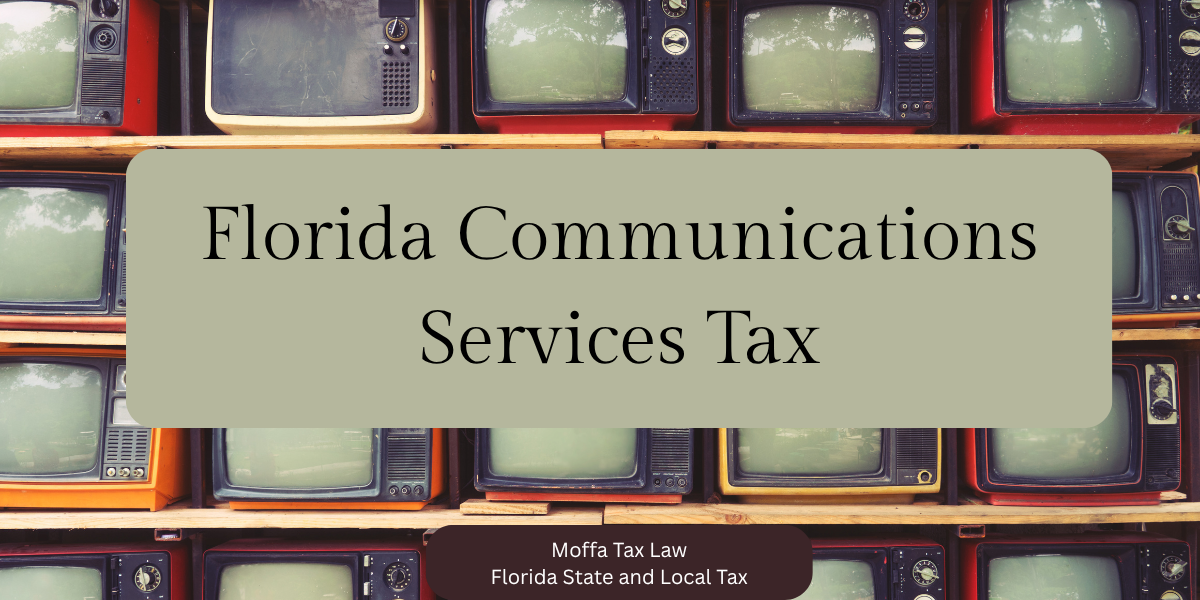NEWS & INSIGHTS


Florida Communications Services Tax: Expanded Scope, Recent Guidance, and Compliance Risks
By Moffa Tax Law | Florida State and Local Tax
What Is the Florida Communications Services Tax?
The Florida Communications Services Tax (CST) is a state and local tax imposed on the retail sale of voice, video, data, and similar communications services. Introduced in 2001 to unify prior taxes on telecom and cable services, CST now applies to a wide variety of modern services, including streaming video and digital content delivery.
How the CST Is Structured
- State CST Rate: 4.92%
- Gross Receipts Taxes: 0.15% (add-on) + 2.37% = 2.52%
- Total State-Level CST: 7.44%
- Local CST Rate: Varies by jurisdiction; separately imposed and itemized
Dealers may combine the 4.92% state CST and the 0.15% gross receipts add-on and list them as “state tax” (5.07%) on customer invoices. All components—state, gross receipts, and local CST—must be itemized separately, and providers are prohibited from absorbing any part of the tax.
Direct-to-Home Satellite Service Rates
Direct-to-home satellite services are taxed differently:
- DTHS State CST Rate: 9.07%
- Gross Receipts Tax: 2.37%
- Total Rate: 11.44%
- Local CST: Not applicable
Examples of CST Application
- Local and VoIP phone services: 7.44% CST + local rate; residential exemption may apply
- Mobile and video streaming: 7.44% CST + local rate; no exemption
- Hotel phones and fax services: 7.44% CST + local rate; no exemption
- Satellite TV: 11.44% CST total; no local rate; no exemption
Recent CST Guidance from the Florida DOR
TAA 23A-009 (April 2023): Streaming Courses Bundled with Devices
This TAA involved an online bar exam course that included access to streaming video and a bundled iPad. The Department found that since the iPad was not separately billed and was used to access taxable video content, the entire charge was subject to CST. Bundled pricing that includes taxable video services must be treated as a taxable communications service unless components are separately itemized.
TAA 23A19-001(October 2023): Influencer Videos and Live Chats
Florida DOR ruled that both prerecorded personalized celebrity messages and live, one-on-one video chats are taxable as “video services.” The interactive or customized nature of the content does not exempt it from CST. The ruling reinforced that services transmitting video—even for entertainment—fall within CST’s scope.
TAA 22A19-002R (2022 Revision): Communications vs. Information Services
This revised advisory clarified that communications services involve transmission of audio, video, or signals, while information services involve data storage or processing. Streaming platforms that transmit digital video are taxable under CST, regardless of how they are delivered. Cloud services focused solely on data manipulation may remain exempt.
TIP 22ADM-07 (2022): Registration and Sourcing Rules
This Technical Information Publication highlighted compliance procedures including registration requirements, sourcing of customer location, exemption documentation, and mandatory e-filing for businesses with over $5,000 in CST liability. It also noted that dealers using the DOR’s certified address database may retain a 0.75% collection allowance.
Update: HB 7063 (2023) froze local CST rates through January 1, 2026. Legislation currently pending in the Florida Legislature proposes extending this freeze further to ensure rate stability and prevent midstream changes by municipalities.
TAA 22A-022 (November 2022): Bundling, Sourcing, and Exemption Enforcement
This TAA emphasized that when taxable communications services are bundled with exempt products or services and not separately itemized, the full charge is subject to CST. It addressed sourcing for nomadic services like mobile and VoIP, reaffirming that billing or primary-use address determines the correct jurisdiction. The ruling also clarified that exemption documentation must be current and on file, and that ZIP code sourcing is not sufficient for compliance. Dealers are responsible for applying the correct jurisdictional tax rate per Rule 12A-19.071, F.A.C.
Final Thoughts: CST Compliance in a Digital Economy
Florida’s CST regime is increasingly being applied to modern, digital, and web-based services. As businesses shift toward remote, app-based, and video-rich offerings, the risk of misclassifying taxable communications services continues to grow. Providers must review their billing structures, service bundles, exemption documentation, and sourcing practices to avoid audit exposure and penalties.
Moffa Tax Law | Florida State and Local Tax Attorneys
© 2025 Jeanette Moffa. All Rights Reserved.
The Florida CST is a state and local tax imposed on communications services like phone, video, and data transmission. It includes a 4.92% state CST, 2.52% in gross receipts taxes, and a varying local CST rate.
Services include traditional telephone, VoIP, mobile, streaming video, cable, satellite, and other transmissions of data or signals. CST applies to both business and residential customers, though some residential exemptions exist.
The total state-level CST is 7.44%, made up of 4.92% state tax and 2.52% gross receipts tax. Local CST rates vary by jurisdiction and are added on top.
Local CST rates are currently frozen through January 1, 2026, under Florida law. Legislation is pending to extend the freeze further, ensuring continued rate stability.
Yes. Florida considers streaming video services, whether live, on-demand, or personalized, as taxable “video services” subject to CST.
Yes. According to TAA 23A19-001, personalized video greetings and real-time video chats with influencers are considered taxable video services under Florida CST.
Yes. The repeal applies broadly to commercial leases throughout the state, including office, retail, industrial, warehouse, and certain self-storage units.
No. Dealers are prohibited from absorbing CST. The tax must be added separately to the customer’s bill and clearly itemized.
CST is sourced to the customer’s service address or primary use location. ZIP code sourcing is not sufficient. Dealers must use accurate address databases and follow jurisdictional rules.
Yes. If a taxable communications service is bundled with exempt products and not separately itemized, the entire charge is subject to CST.
Share
Additional Articles by the SALTy Orange at Moffa Tax Law:
NEWS & INSIGHTS Florida Corporate Income Tax Lawsuits Quiet Through Fall as COP Cases Put on Hold …
Florida Communications Services Tax: Expanded Scope, Recent Guidance, and Compliance Risks
NEWS & INSIGHTS Florida Communications Services Tax: Expanded Scope, Recent Guidance, and Compliance Risks Florida Communications Services Tax: Expanded Scope,…
Florida Repeals Sales Tax on Commercial Rent — Will DeSantis Sign the Landmark 2025 Tax Cut?
NEWS & INSIGHTS Florida Repeals Sales Tax on Commercial Rent — Will DeSantis Sign the Landmark 2025 Tax Cut? …

Jeanette Moffa, Esq.
(954) 800-4138
JeanetteMoffa@MoffaTaxLaw.com
Jeanette Moffa is a Partner in the Fort Lauderdale office of Moffa, Sutton, & Donnini. She focuses her practice in Florida state and local tax. Jeanette provides SALT planning and consulting as part of her practice, addressing issues such as nexus and taxability, including exemptions, inclusions, and exclusions of transactions from the tax base. In addition, she handles tax controversy, working with state and local agencies in resolution of assessment and refund cases. She also litigates state and local tax and administrative law issues.


